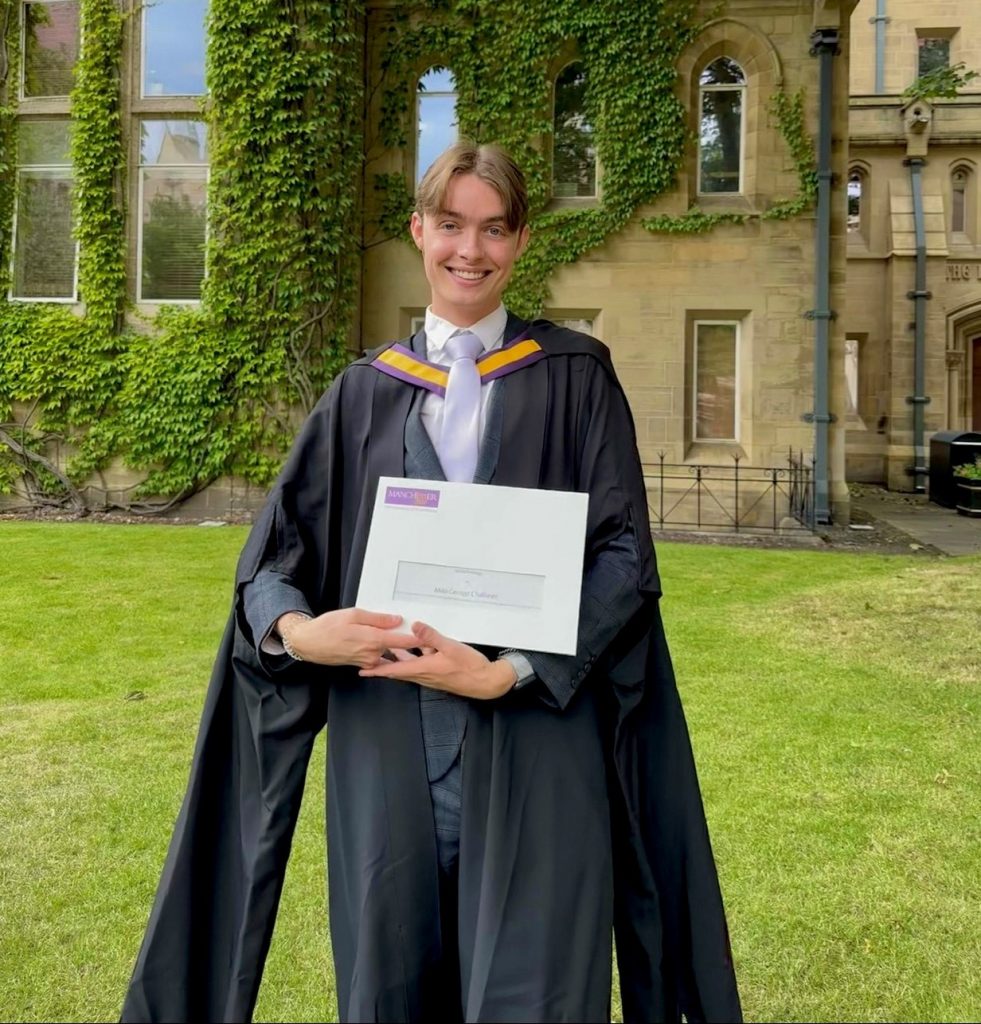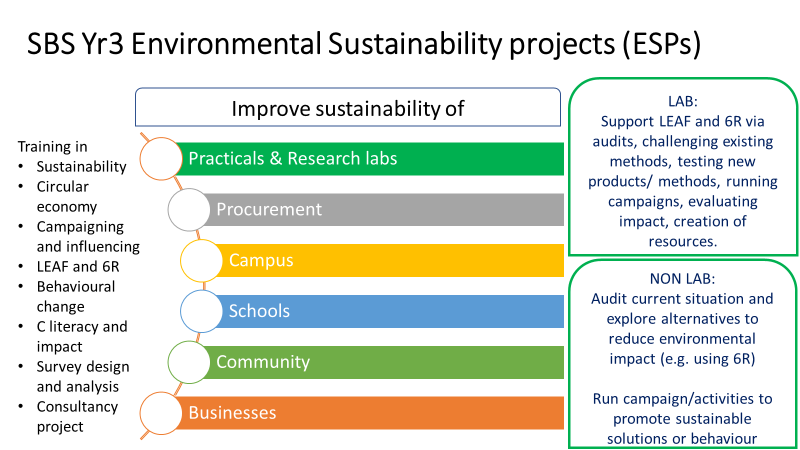
From an SBS Environmental Sustainability project to a career in Sustainability: Interview with Milo Challiner
Milo Challiner is a former BSc Biotechnology student at the University of Manchester. In this interview, he describes how his experiences with SBS Environmental Sustainability projects (ESPs) have led him to his current career path in the sustainability sector.
Please tell us about your studies and where your personal interest in sustainability stemmed from
I chose to do a BSc in Biotechnology due to my interest in biology as well as the diverse range of topics that the course covers. The course offers a range of modules from lab work to business and sustainability modules, and I quickly realised that I enjoyed some modules more than others. I was also engrossed and fascinated by nature documentaries such as the ones David Attenborough used to narrate. They slowly shifted from a focus on educating us on the various species that we share our planet with, to a heavier focus on climate change and the impact that this had on our environment.
During my second year at university, my tutor Dr Maggy Fostier would invoke discussions surrounding sustainability topics and how biotechnology could be applied to have a positive environmental impact such as the use and production of bioplastics. This was a turning point in my life where I realised that pursuing this passion for sustainability meant I could make a difference and do something that I could be proud of.
In my final year, it was a natural fit for me to choose the Environmental Sustainability projects. The figure below illustrates the concept: following a broad programme of training seminars in semester 1, students carry out specific projects to either
- improve the sustainability of university operations in the labs or on campus,
- improve biodiversity on campus,

How did the ESP training and projects impact your skills/awareness and your decision on your future career?
I cannot stress enough how useful the ESP was. The training was broad, giving us the foundation for all our projects and a possible career in that field. The skills, knowledge, autonomy and experience gained from leading your own project is invaluable. In job interviews, the project always came up and I could always refer to it due to the number of skills that I gained.
My project explored ways to reduce single use plastics in the Fly facility. Communication skills were used to regularly communicate with my supervisor, lab manager, other staff members, as well as setting up interviews with other research groups across the UK, US and India. I gathered primary research and conducted audits to come up with advice on how to maximise a reduction in plastic waste and carbon emissions whilst ensuring that it was as cost effective as possible.
I prepared presentations to display my results and had the opportunity to present at the FBMH ES showcase. It also gave me insight into the lifecycle of the plastics I was researching, from the production, reuse and disposal routes and how carbon emissions could be calculated at each stage, as well as the constraints surrounding the disposal of materials used when studying genetically modified organisms.
From conducting this project, I realised that I thoroughly enjoyed it which further confirmed that this was something I wanted to do after graduating. It was also decided by my supervisor Prof Andreas Prokop and Dr Maggy Fostier that the findings were worth disseminating, so I was able to contribute to a manuscript and see how one moves from a student project to a professional academic output.
Other influences on your decision to choose a career in this sector?
As I mentioned before, pursuing a career in sustainability meant I could make a difference. A feeling I always had growing up and hearing about the negative impact humanity had on climate change was helplessness. This is a feeling I no longer have, and it feels great turning up to work doing something that I am passionate about as well as knowing I am making a difference.
Describe your path to find a job in this sector (difficulties, breakthroughs, top tips)
If I’m being honest, my path to finding a job was tough. The job market in England is incredibly competitive, especially in sustainability as I was often competing with 100 other graduates for one role. The interview processes are long, and you must deal with a lot of rejection. Do not let this discourage you: I went through this process, and now I’ve a job that I enjoy. You just have to persevere and take every rejection as an opportunity to learn and improve for the next time. No matter how disheartening it can get, you must remind yourself that you will eventually get a job because if it is hard for you, it’s hard for everyone else.
I hope that my experience in finding a job can be an opportunity for others to do all the things I wish I had done to improve my chances at finding a job sooner. Here are my top tips
- Get as much work experience as possible e.g. summer internships, part time job or volunteering. For summer internships, I advise you look 8-10 months before as the deadline to apply are around 6 months before it starts. Don’t make the same mistake as me and start looking for them just before the summer.
- For sustainability roles with a degree in biosciences, unfortunately a lot of companies may not see this as a degree with enough expertise in the field. Therefore, I would advise you to take part in as many volunteering or work experience opportunities linked to sustainability as possible to increase your chances at getting a role in this area. For example, you could volunteer at the Firs or as a 6R champion. If you can’t get experience, try applying for short course that last a few months such as Carbon Literacy Courses for example so that you can gain insight into the topics you are interested in in more depth and get a certificate.
Your job now: what do you do? Link to biosciences/degree?
I’m currently working at Salix Finance as a Client Support Officer. The company delivers government funding schemes across the UK to support organisations within the public sector to boost their energy efficiency, reduce their impact on the environment, save money and to remove more households from fuel poverty. As a CSO, my role is to support and monitor the delivery of UK public sector decarbonisation projects, which are funded through grants and loans.
Although I am not applying any of my bioscience knowledge to my work, there are many soft skills that I use daily such as communication and teamwork, project and time management as well as knowledge and experience gained from the ESP.
Any eye openers about ES as a job? Perhaps skills/opportunities students should focus while at Uni?
As previously mentioned, I would advise to get as much experience or knowledge as possible surrounding the area you are interested in. Sustainability is so much more than just the basic ‘sustainability knowledge’ and there are other things such as governmental policies and regulations, the use of data analysis tools or a companies approach to ESG that all impact how the work is conducted so try and broaden your knowledge to cover as many of these topics as possible. Sustainability is always changing and innovation is always affecting this field so stay up to date with different changes or new emerging technologies that are impacting and altering the way work is done around different sustainability areas.

0 Comments